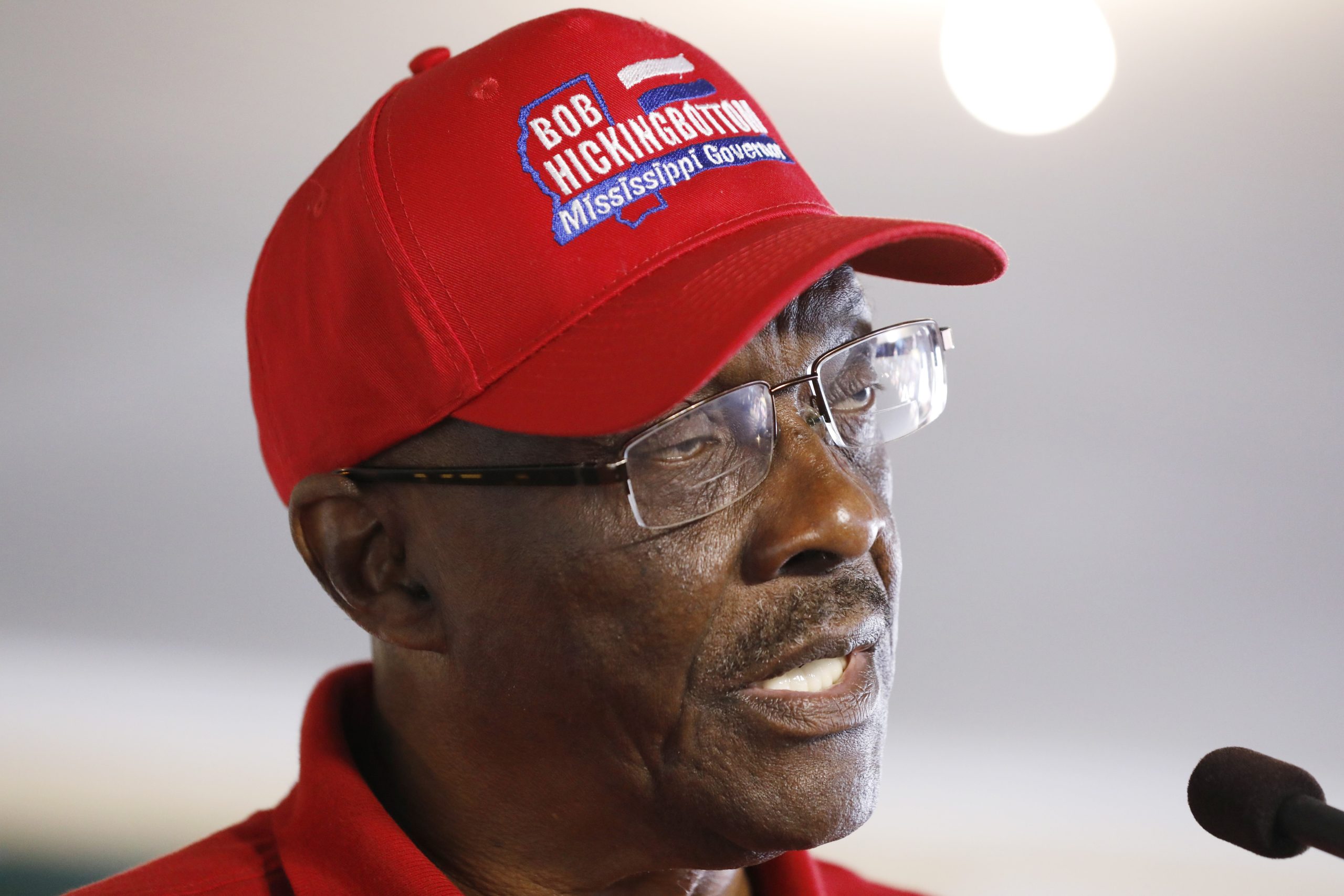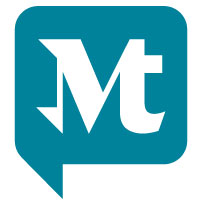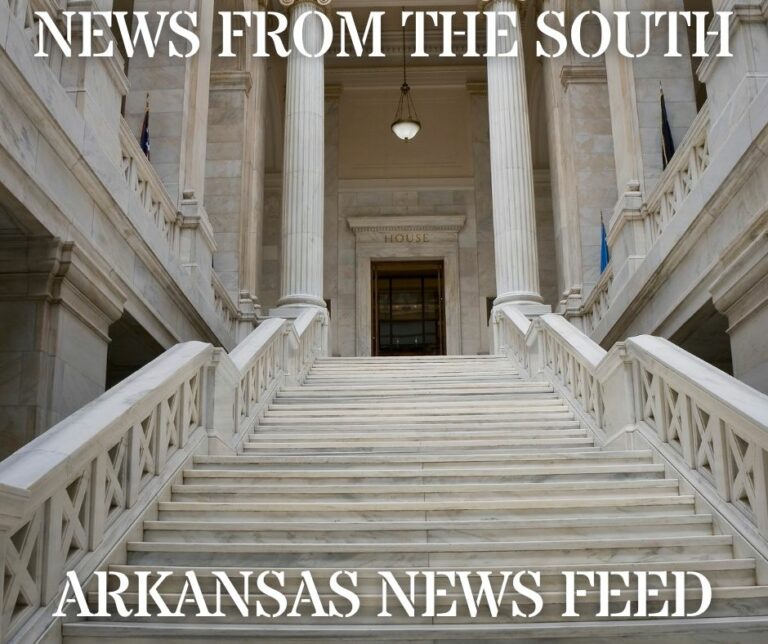Mississippi Today
What is Bob Hickingbottom up to?
What is Bob Hickingbottom up to?
Bob Hickingbottom, a little-known Democrat running for governor in 2023, posted a soon-to-be viral message to his campaign Facebook page on Feb. 17 around 3 p.m.
“… I hope you will join me and vote for the Democrats from the top to the bottom of the ticket. With the exception of my good friend Lt. Gov. Delbert Hosemann who has to run as a Republican to win. Delbert is really a Democrat and has been our friend through the years. We all need to do everything we can for him,” Hickingbottom wrote to his 400 or so page followers.
A few minutes later, at 3:34 p.m., Hosemann’s GOP opponent in the August primary for lieutenant governor, state Sen. Chris McDaniel, posted a screenshot of that Hickingbottom post onto his own page with the post: “There you have it. Democrats Love Delbert! #DelbertTheDemocrat.”
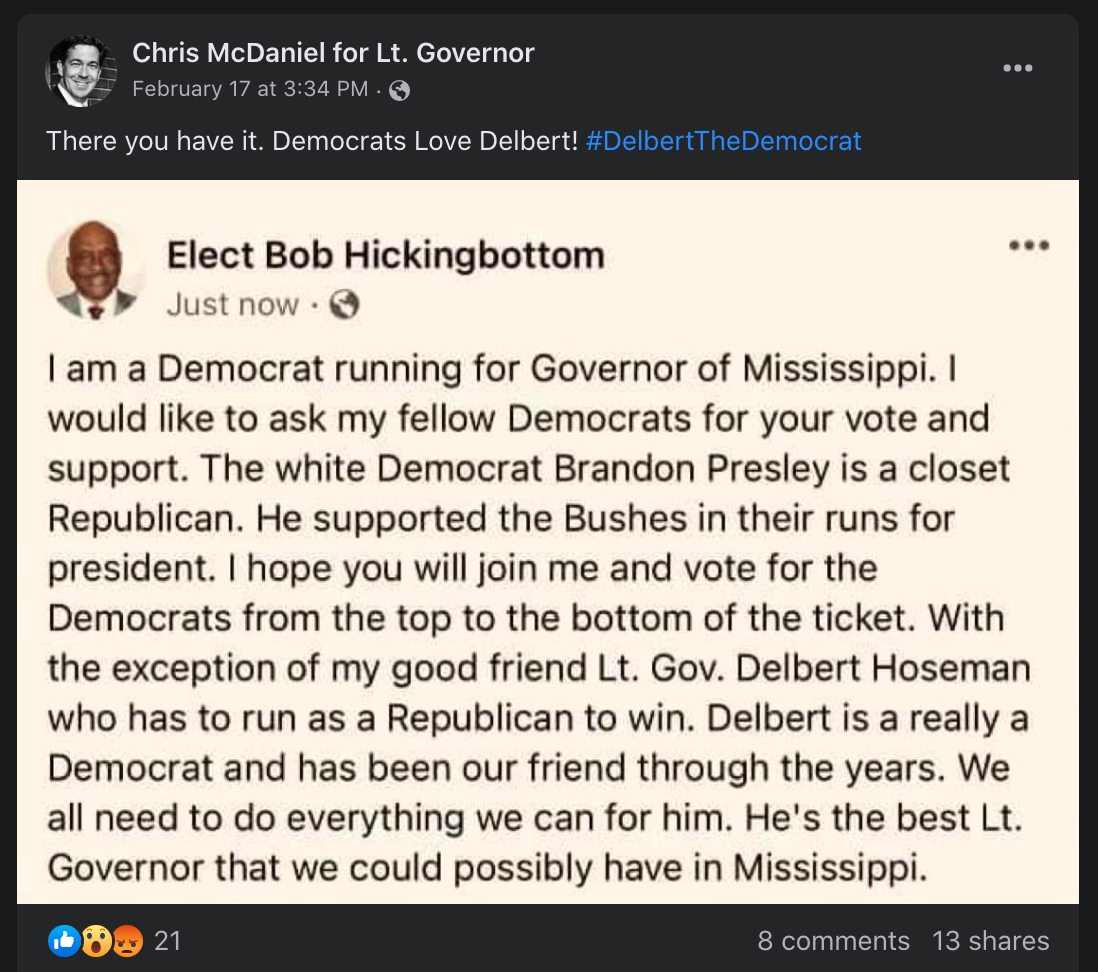
McDaniel is the far-right conservative who developed a national brand and following in 2014 when he nearly defeated longtime U.S. Sen. Thad Cochran. In that 2014 race, McDaniel ran what is considered the first Mississippi campaign to realize the full political power of social media. He has since sharpened that skillset and has hundreds of thousands of followers of like-minded, fired-up conservatives across the state and nation.
After McDaniel posted the Hickingbottom screenshot, his social media machine got to work. Several right-leaning and pro-McDaniel Facebook groups and users begin reposting it with the hashtag #DelbertTheDemocrat. Many of these other accounts have ridden McDaniel’s coattails in the development of their own brands and social media followings.
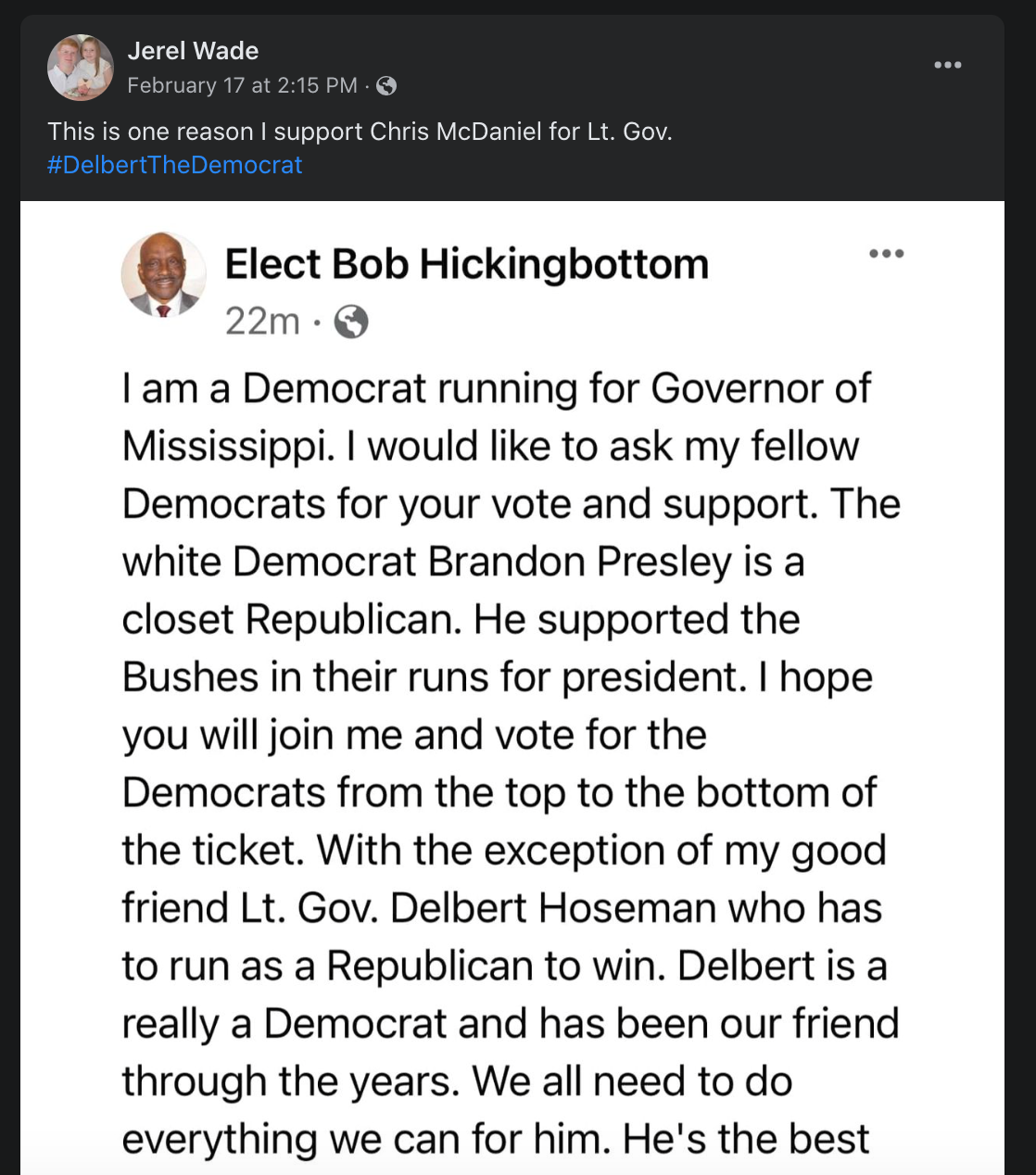
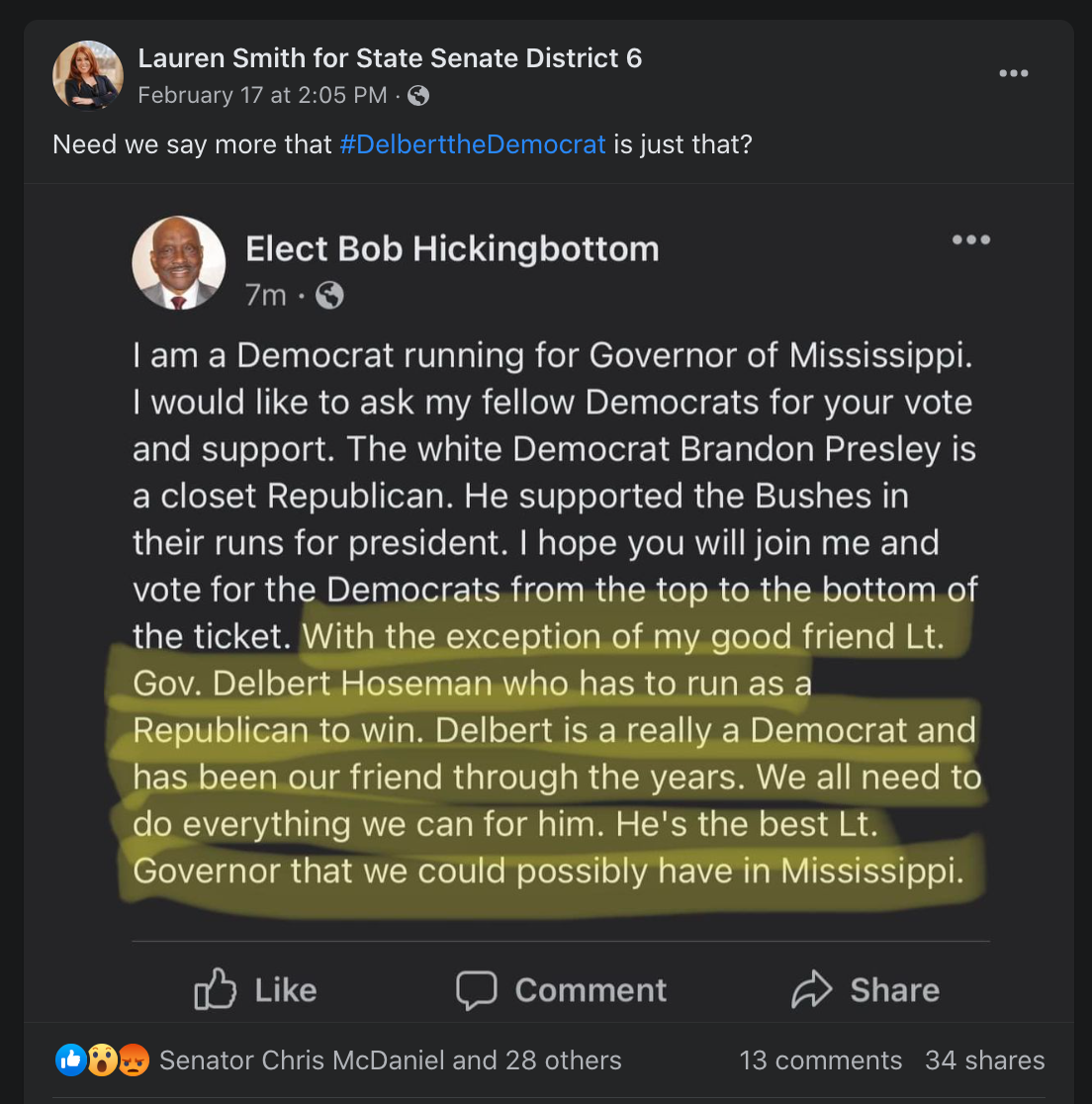
That evening, though, several Facebook users posted a different version of the Hickingbottom screenshot that spread quickly through Mississippi’s far-right conservative online spaces. This separate version of the Hickingbottom screenshot clearly showed something peculiar under the post: “Posted by Ashley Rae Bright.”
Social media savants know that those words being listed there indicates that a woman named Ashley Rae Bright is the “Elect Bob Hickingbottom” Facebook page administrator. In political campaigns, Facebook administrator duties are typically reserved for staffers of a campaign. It’s a delicate and important power to wield, and campaigns, in particular, are very careful about who gets granted that access.
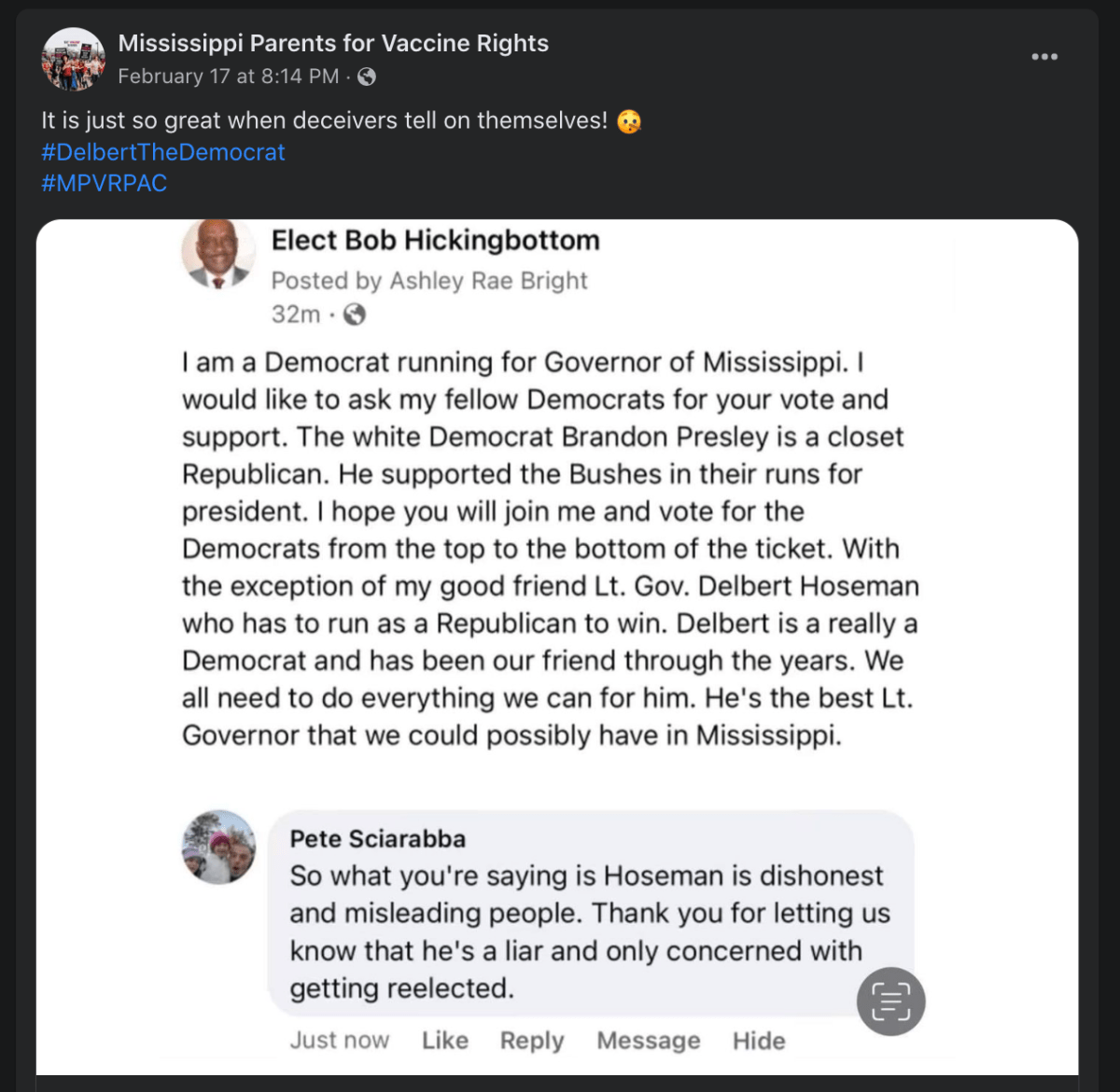

A quick Google search of Ashley Rae Bright shows that she is a consultant for The Allain Group, a Jackson-based political consulting company “offering strong strategic and creative expertise to political campaigns and business clients.”
The president of The Allain Group is Lane “L.C.” Murray, a longtime Mississippi political operative. Murray, a self-admitted former member of the Ku Klux Klan, became a controversial player in the 2014 Senate race between McDaniel and Cochran.
Murray told Breitbart News during the 2014 race that he was a McDaniel supporter after Murray threatened a Republican state senator by phone. His former membership to the KKK was a focus of the Breitbart piece.
Mississippi Today contacted Murray last week to ask if The Allain Group was working for Hickingbottom’s campaign in any way.
“The Allain Group hasn’t been hired by him,” Murray told Mississippi Today in a phone interview. “I do know Mr. Hickingbottom, he’s a better friend than anything else. I haven’t talked to him in a while. I know he’s had COVID and he recently got kicked off the Democratic ballot. But no, Hickingbottom has not contacted The Allain Group, and we are not doing anything for him.”
Asked why Bright, an employee of The Allain Group, appeared to be an administrator of the Elect Bob Hickingbottom Facebook page, Murray deflected.
“I don’t know anything about that,” Murray said. “She works some part time for us, uh, back and forth. I remember her saying something about her computer being hacked or something like that. She was raising hell one day about her Facebook had been hacked. But I’m going to talk to her in the next hour or so, and I’ll call you back and tell you what I find out.”
Murray hung up and called back later that day with an update.
“She does not know Bob Hickingbottom,” Murray said of Bright. “She said somebody hacked her computer, something about someone posting something to his campaign page. She reported it. A day or two later somebody hacked it with something else. I don’t know too much about computers. But like I said, I do know him, but we’re not doing any work for him at all.”
Mississippi Today reached out to Bright directly on Facebook and asked if she was working for the Hickingbottom campaign.
“Sir, I do not know the gentleman,” Bright wrote in a message. “My Facebook was hacked a couple times several weeks ago.”
When Mississippi Today sent Bright a screenshot that showed her as the Elect Bob Hickingbottom Facebook page administrator, Bright replied: “I seen that post as well, changed password and all. I don’t know him so therefore I can’t help you.”
When Mississippi Today then asked why a hacker would make her an administrator of Hickingbottom campaign’s Facebook page to post a political message, she doubled down on her denial of any work with Hickingbottom.
“Sir, I told you I do not know the gentleman,” Bright replied. “I do not know how that showed up on my Facebook. I’ve answered your questions. Now please leave me alone!”
Bright and Hickingbottom are friends on Facebook. Mississippi Today did not get the chance to ask Bright about why she is Facebook friends with someone she purportedly does not know before she declined to speak further.
Hickingbottom, 75, has been involved in Mississippi politics for decades. He broke through working as a political operative for scandal-ridden former Jackson Mayor Frank Melton. Speaking on popular conservative radio host Kim Wade’s show in 2007, Hickingbottom put his career this way: “I’ve been at the forefront of every dirty deal that was cut in politics.”
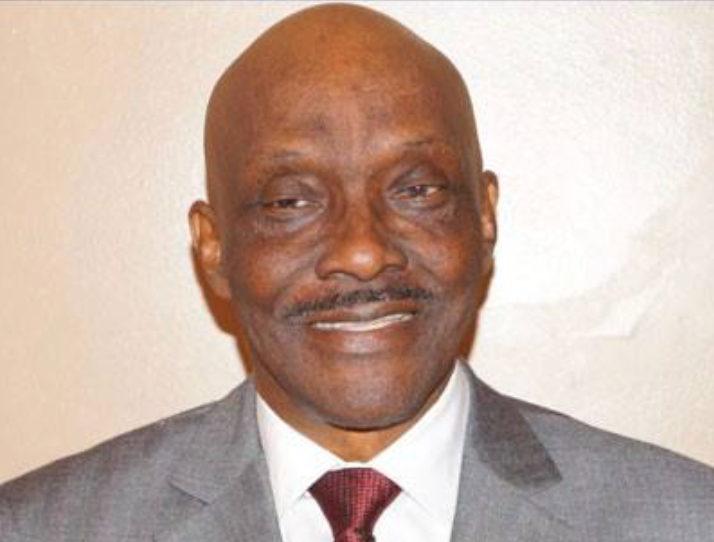
In 2019, Hickingbottom ran for governor as a Constitution Party candidate, using his limited platform to blister Democratic nominee Jim Hood, who came within six points of defeating now-Gov. Tate Reeves. In public Facebook posts during that race, Hickingbottom rarely turned his ire toward Reeves.
And most recently, Hickingbottom has been the subject of broad statewide news coverage after he and another candidate for governor were disqualified from the 2023 Democratic ballot. State Democratic Party officials say he was disqualified for not filing a statement of economic interest, a required form where candidates publicly disclose their personal business interests, and required campaign finance reports when he ran for governor in 2019. Since his disqualification, Hickingbottom has publicly panned Democratic Party leadership and has even threatened a lawsuit.
In a Mississippi Today interview with Hickingbottom last week, he said he thought it was “unconscionable” that the Democratic Party would disqualify two Black men in a primary against Public Service Commissioner Brandon Presley, who is white and widely regarded as the party’s frontrunner.
But later in the interview, talking about his political background, Hickingbottom said: “I’m pretty conservative myself, to tell you the truth. I’m honestly too conservative for the Democrats probably.”
“I’ll put it to you this way, I’m a political operative,” Hickingbottom said. “I’ll work with whoever hires me, Democrat or Republican or whoever.”
Mississippi Today asked Hickingbottom in the interview about the controversial Facebook post about Hosemann and the apparent ties to The Allain Group.
Hickingbottom told Mississippi Today that he published the Facebook post himself. Asked why Bright was listed as his Facebook page administrator who posted it, he got weird.
“I don’t, well, I don’t know an Ashley Bright. I don’t know who she is” Hickingbottom said before abruptly changing the subject.
When Mississippi Today circled back about why Bright showed up as the administrator of his campaign Facebook page, Hickingbottom paused.
“I’ll be honest with you, I’m an old guy and I didn’t even know anything about computers,” he said. “… I know how to do email and put stuff on Facebook, and I learned that basically through my telephone. All I can tell you is I don’t know her, I’ve never met her. Maybe she got hacked. All I use Facebook on is my phone. My phone has been hacked many times. I’ve had a reputation — let’s just put it like this, I was a flamethrower … I have a lot of enemies.”
He said several times during the interview that he believes Hosemann, a successful politician who has won four statewide elections as a Republican, is a Democrat. Hickingbottom said that he did not intend to hurt Hosemann nor help McDaniel.
“In 2014, I was on the air with other people talking against Chris McDaniel,” Hickingbottom said. “He was Tea Party, trying to do Thad (Cochran) in. We were talking about him real bad. A lot of people asked us to rip Chris McDaniel and get people to vote for Thad Cochran.”
Asked if he’d in any way solicited the help of The Allain Group to work on his campaign, Hickingbottom said he hadn’t. But he did acknowledge he knew Murray, the president of the consulting firm.
“I’ve known Lane Murray, he’s a fixture in politics,” Hickingbottom said. “I’ve been an operative myself for years and years. I know Lane Murray, Greg Brand, and to some extent they know me. But I haven’t seen him in two or three years at least. Since probably the end of 2020. I know him, but that’s the extent of it.”
Greg Brand, whom Hickingbottom mentioned unprompted, is another Mississippi political operative with a troubled past.
In 2016, then-Secretary of State Hosemann pushed then-Attorney General Jim Hood to pursue charges against Brand for violating election law — specifically for mailing attack ads without identifying the group or individual who sent it. Brand and another operative were sentenced to six months probation and a $500 fine. Brand briefly tried to sue Hosemann in federal court over the episode, but that lawsuit was dismissed.
There’s yet another strange tie between Hickingbottom and The Allain Group: they are immediate neighbors in the same Jackson office building, according to Mississippi Secretary of State records.
Hickingbottom, who owns a company called “Blackstone Distributors LLC,” lists his business address at 1755 Lelia Drive, Suite 232, Jackson, MS 39216. The office for The Allain Group is 1755 Lelia Drive, Suite 222, Jackson, MS 39216. The suites are directly next to one another on the second floor of the office building.
Hickingbottom told Mississippi Today he had a small office space at that address “a couple years ago, but I was wasting money by paying for it so I moved out.”
Murray repeated something similar.
“I’ve been in that office for four or five years,” Murray said of the office. “He had an office close to mine, a little one room thing. I might have seen him once or twice, but I don’t think he’s been in there for two or three years.”
Both Murray and Hickingbottom denied any coordinated effort to help McDaniel’s campaign.
Meanwhile, Hickingbottom continues posting incendiary Facebook posts about Hosemann. And McDaniel and his far-right social media circles keep using Hickingbottom’s posts to campaign directly against Hosemann. The strategy appears thorough and coordinated, and it has continued for weeks.
Radio host Kim Wade, a longtime and active public supporter of McDaniel, again had Hickingbottom on his show on Feb. 21 — just four days after Hickingbottom’s controversial Facebook post.
When Hickingbottom reiterated on the show that Hosemann was a Democrat, Wade replied: “Wow. There is some validity to what you’re saying given how he treated President Trump and how he treats conservatives. We can ignore it at our own peril.”
A clip of that radio show made its rounds on McDaniel’s social media.
“A MUST LISTEN,” McDaniel’s 2014 campaign manager and current state Sen. Melanie Sojourner posted to her Facebook page with a clip to the Wade interview.
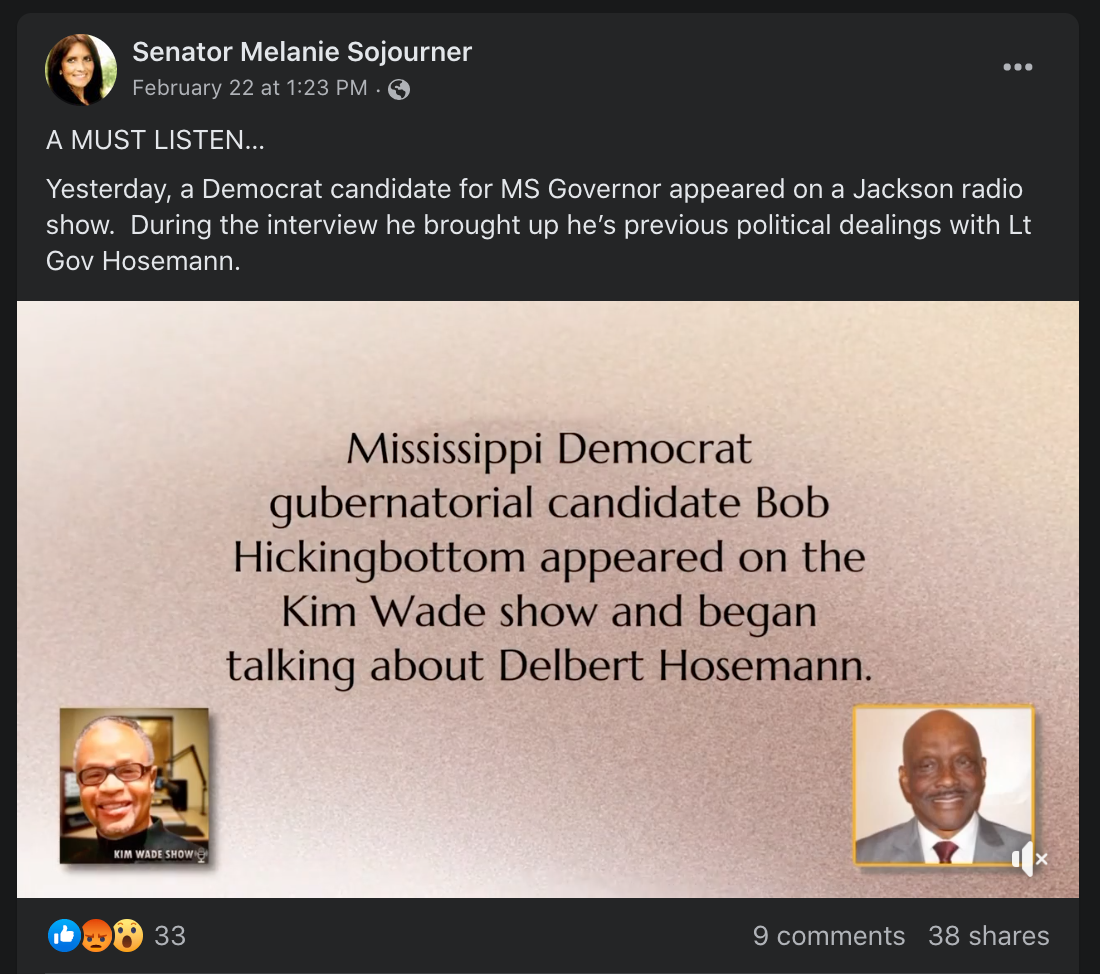
McDaniel posted the same radio clip to his own Facebook page with similar language to Sojourner’s post: “BREAKING: This is a MUST LISTEN. Democrat candidate for Governor discusses Delbert Hosemann: ‘He’s a Democrat.’”
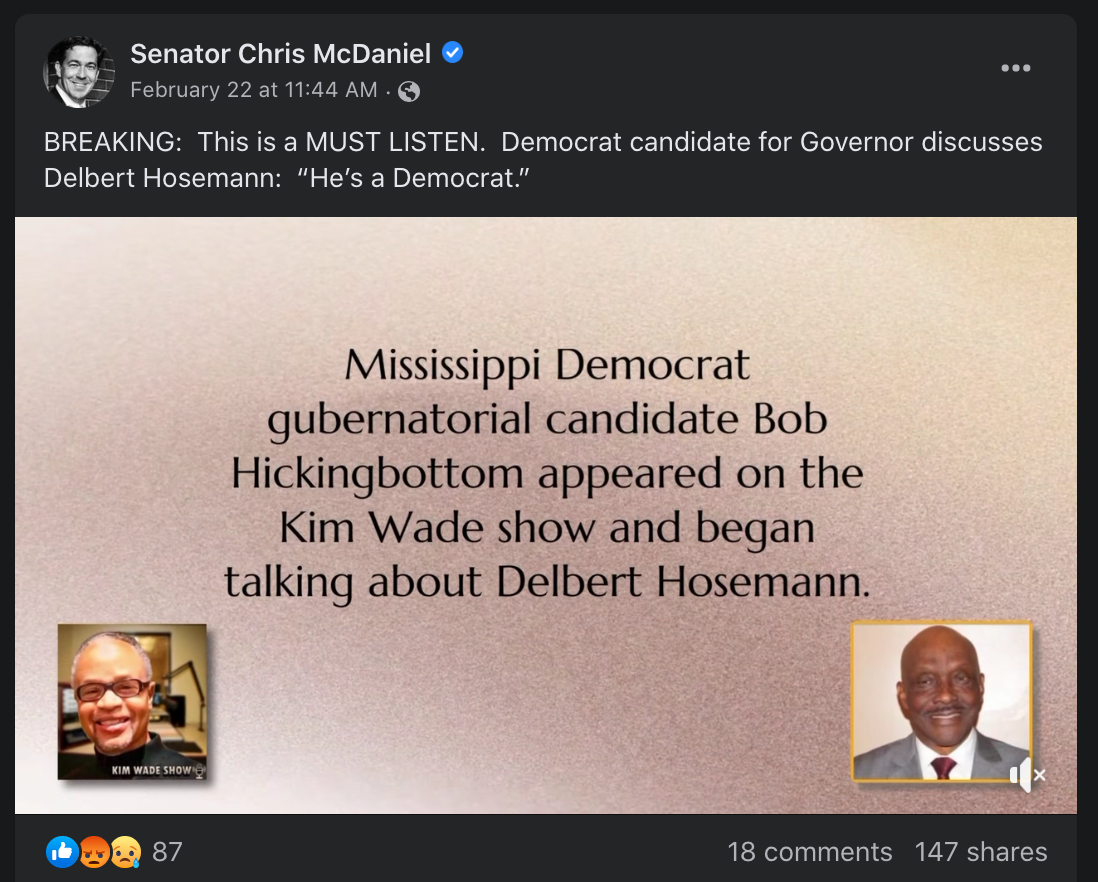
Others in right-wing media have been singing the same tune. Jim Cegielski, publisher of the Laurel Leader-Call newspaper and a longtime McDaniel lackey, wrote a column about Hickingbottom’s shock claim with the headline: “Delbert’s a Democrat … Bet your Hickingbottom dollar on it.”
McDaniel posted that column to his hundreds of thousands of social media followers multiple times. In all, McDaniel has posted at least 10 separate posts to his social media pages boosting Hickingbottom’s words and using them to paint Hosemann as a Democrat.
“BREAKING NEWS: Delbert Hosemann gets a huge endorsement this week,” McDaniel posted on Feb. 23. “You are not going to believe it! We’ve always known Democrats love Delbert Hosemann behind the scenes, but now they are becoming public in their support. A Democrat candidate for Governor, Bob Hickingbottom, publicly endorsed Delbert Hosemann this week!”
That long post from McDaniel went on to mention the Kim Wade radio interview, closing the post by writing: “Perhaps Bob Hickingbottom did say it best — Delbert is the best Lt. Governor that Democrats could possibly have in Mississippi. It’s time for a change, Mississippi.”
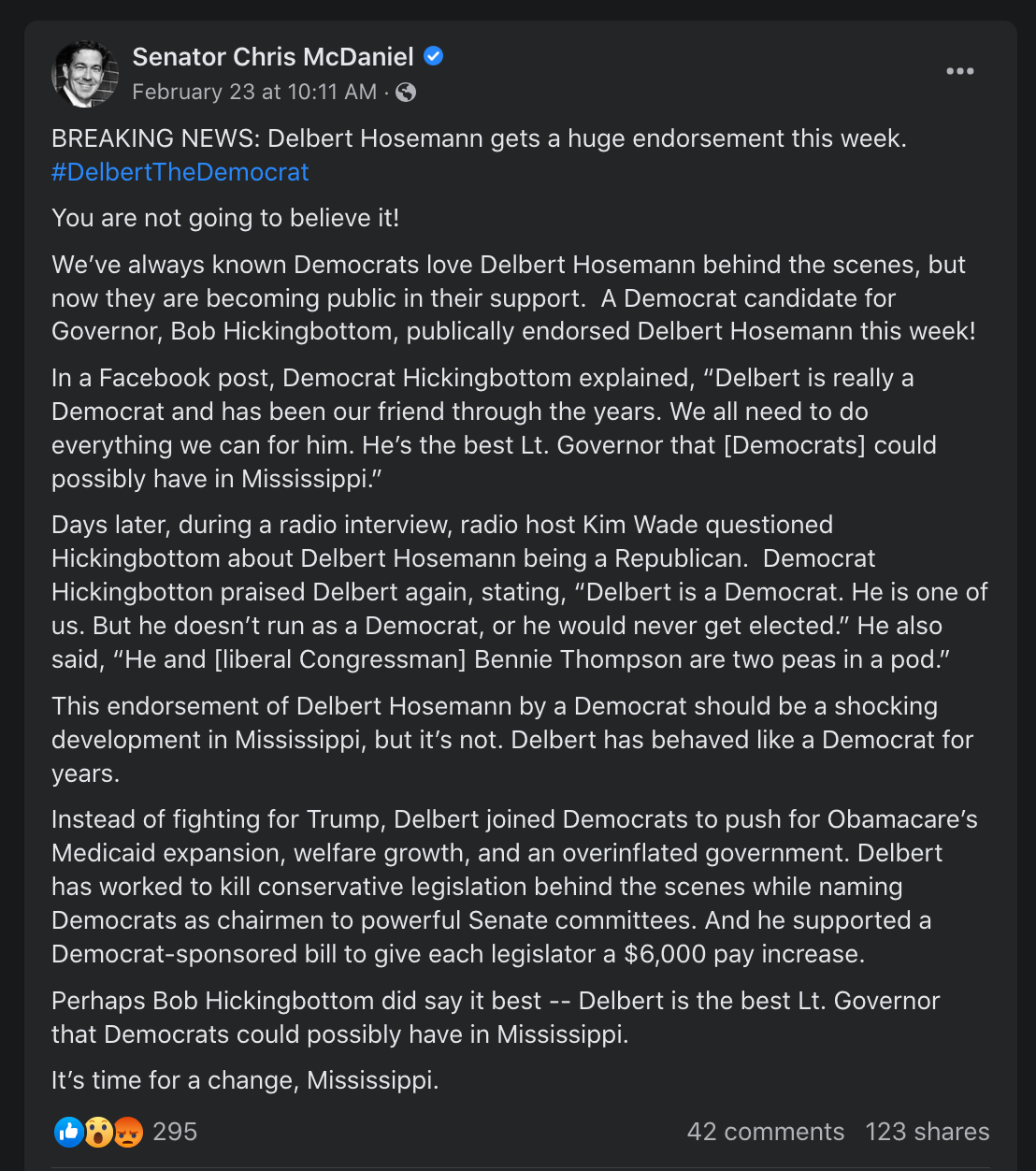
Hickingbottom, for his part, keeps on posting, even after Mississippi Today questioned him about his posts.
On March 7, Hickingbottom posted a letter he says he sent to Hosemann.
“To my fellow Mississippian and friend Lt. Governor Delbert Hosemann,” Hickingbottom’s letter begins, “I have been told that I may have hurt you and your re-election campaign for Lt. Governor. I sincerely hope that is not true because that was not my intention. If you recall, I first met you many years ago when I was introduced to you by our mutual friend Louis Armstrong. In those days we were all proud Democrats like most of Mississippi at the time.”
On March 9, Hickingbottom posted a rambling, all-caps post that reiterates he never meant to hurt “Lt. Gov. Delbert Horseman (sic).”
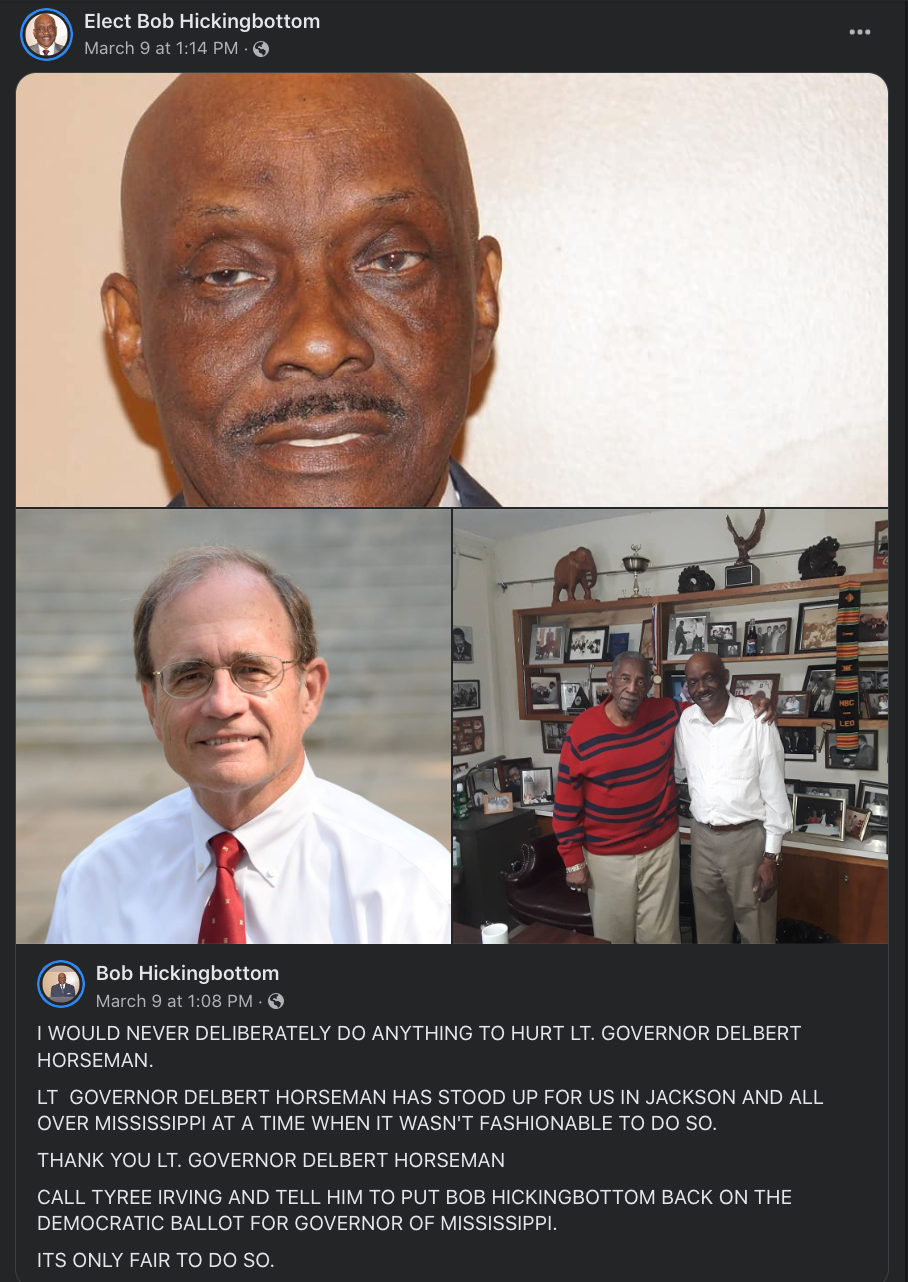
On March 12, Hickingbottom posted a criticism of Hosemann for his work to change the Mississippi state flag in 2020, retiring the state’s last-in-American Confederate battle emblem design to a museum. That is a pirated talking point from many of McDaniel’s supporters.
Asked for comment, the Hosemann campaign appeared to be following the sequence of Hickingbottom events closely.
“This scheme was concocted to create a false narrative to support a losing campaign,” said Casey Phillips, senior adviser for the Delbert Hosemann campaign. “Why else would a former Klansman and known McDaniel supporter be running this person’s Facebook page? Before we know it, they will all be locked up in a courthouse again.”
Phillips said Hosemann does not Hickingbottom, and that Hosemann has never received any letter from Hickingbottom — including that strange March 7 letter posted to Facebook.
The courthouse reference, of course, harkens back to the 2014 U.S. Senate race, when a McDaniel campaign staffer and two McDaniel supporters were found locked in the Hinds County Courthouse late on election night — one of just many shocking wrinkles of that wild race.
McDaniel’s campaign denied working with or communicating with Hickingbottom’s campaign and said that Murray is not working for the campaign.
“Unequivocally, neither Senator McDaniel nor any member of his campaign apparatus are communicating with, coordinating alongside, nor focusing on Bob Hickingbottom’s candidacy,” said Nicole Tardif, spokesperson for McDaniel’s campaign.
Murray, who told Mississippi Today last week he was not working with McDaniel, apparently fashions himself as working behind the scenes for the conservative state senator.
With the past week, Murray sent text messages to several people across the state. One person, granted anonymity over fear of retribution from the Ku Klux Klan, shared the Murray text with Mississippi Today. The message’s focus: “Delbert the Democrat.”
This article first appeared on Mississippi Today and is republished here under a Creative Commons license.
Mississippi Today
This superintendent took a failing Delta school district to a ‘B’ rating. Now, she’s leaving
INDIANOLA — The top of the Jeep was down, and Miskia Davis was behind the wheel, leading a parade through downtown Indianola.
It was 2019, just two years after the now 50-year-old Davis became superintendent of Sunflower County Consolidated School District. Back then, she wasn’t sure this moment would ever come.
She recalled feeling the first cool breeze of October as she waved at people who lined the street, smiling and celebrating.
But it had — the district’s first “C” rating, its first passing grade, and the community had shown up to a parade to celebrate the achievement. Generations of teachers and Sunflower County graduates stood on the sidewalk, proudly cheering the assembly of cars and students.
“It was … Oh my God,” Davis said. “My children were like, ‘We did something.’”
The work hadn’t been easy, but it had been worth it, Davis thought — the number crunching, the doubt and lukewarm welcome she felt from the community, the tough decisions she’d had to make.
Now, she’s ready to move on.
Daughter of the Delta
From starting kindergarten to subbing for elementary classes, Davis’ childhood and career in Sunflower County and her identity as a daughter of the Delta were her strengths in the classroom, she said.
“I grew up in Drew, poor and with two young parents,” Davis said. “We didn’t have elaborate meals, and when I went home, the lights may have been off. But it made me who I am, and these children were experiencing the same things I experienced as a child.”
So Davis was relatable. But as a young high school teacher at Ruleville Central High School, some of her students looked older than her and many were taller than she was. She was forced to learn how to command respect, too.
One particular child taught her an invaluable lesson. He was a star football player in her biology class, and he was failing the course by two points. He caused trouble in class and Davis was determined to fail him, despite more experienced teachers prodding her not to, to look past her own ego.
So Davis gave him another chance. She had him do extra work and spent hours talking to him. She learned why he behaved poorly in class — he was one of seven children to a young, single mother.
“He was angry at the world, and I just happened to be in the world,” she said. “It taught me the power of relationships. I think that’s the most important catalyst in transforming education.”
It was during that time that her superintendent “saw something” in her and pushed her to become a school leader. That kickstarted her journey in administration.

Davis soon learned she had a particular gift for turning failing schools around. Under her leadership as principal, Ruleville Middle School went from failing to an “A” letter grade in three years.
Her school improvement strategy began to take shape, similar to her teaching style. Davis was both a disciplinarian and someone to whom teachers and students could relate. She prioritized building strong relationships with teachers who were invested in their students. But she didn’t shy away from making controversial decisions, either. In Ruleville, she fired nearly all of the staff when she arrived.
But as Davis was gaining her footing as an administrator, Sunflower County School District was struggling.
After consistent failing grades resulted in the state takeovers of Indianola, Sunflower and Drew school districts, the Legislature decided to consolidate the three systems in 2012.
District consolidation is a massive undertaking for any community, but especially for Sunflower County — smack dab in the middle of the Delta, an under-resourced region with a shrinking population, high poverty rates and a deep history of racial exploitation.
Davis arrived in 2014 to a school district that had lost hope — a district that she didn’t recognize.
All Sunflower knew was ‘failure’
Davis never wanted to be superintendent.
She spent three years working under the leader of the consolidated district. But when the superintendent was dismissed in 2017, Davis was appointed to the head role in an interim capacity. She got the job in January of 2018 without ever applying.
So with another state takeover looming, Davis went to work. The biggest challenge? The district and the community seemed resigned to failure.
“We had been failing so long, that’s all we knew,” she said. “No one was even sad.”
Early on, Davis visited a school to discuss recent test results. She was so struck by teachers’ apathy that she stopped the meeting midway and had them tear off a scrap of paper and write “yes” or “no” to a question: Did the teachers believe their school could ever be successful?
More than half said no.
“They were teaching my children,” Davis said, tearing up. “And they didn’t think they would ever be successful.”
Davis went to the school board to tell members that she wouldn’t be renewing many of those teachers’ contracts. That’s when she realized she didn’t just need to boost test scores — she needed to change attitudes.

The hashtag #WINNING was born.
“We started to celebrate every little accomplishment,” Davis said. “We got T-shirts, shades, whatever. That was our mantra.”
Children received certificates for a week of perfect attendance. When students did well on benchmark assessments, teachers were ushered into the hallway to be celebrated by students and colleagues. Davis created the “Killin’ It” awards, given to students and teachers for meeting their testing benchmarks.
They were just certificates, at the end of the day. But it led to a changed school culture, a renewed belief that they could succeed.
As an administrator, Davis leaned on what she knew worked as a teacher, relationship-building and strong discipline (she even sent her nephew to alternative school for fighting), and combined it with a data-driven approach and an eagle-eyed focus on testing.
She put an academic coach in every building, whose sole responsibility was supporting teachers.
Davis took teacher Dylan Jones out of the classroom and put him in the central office, where he was tasked with tracking district metrics.
Jones uncovered which consultants were working and which were uselessly costing the district millions. The district went from contracting with 30 firms to just four.
Jones also created an accountability system for teachers. With one click, Davis could see how each teacher’s students were performing, and she gave everyone access to the data. If teachers weren’t meeting their goals, Davis hosted regular meetings and had them explain — in front of everyone — what they needed to succeed.
Davis’ methods weren’t popular at first. Educators went to the school board and complained that the system was “punitive.” Some even quit. But Davis was steadfast and implored board members to see the work she and her team could do, if given the chance.
The district’s rating didn’t budge in 2018.
But in fall 2019, after Davis’ first full year as superintendent, Sunflower County Consolidated School District had earned its first “C” rating.
What happened after the first ‘C’
Those early years were difficult, Davis remembered, because she felt so isolated, just her and her team “in the trenches.”
She hosted community meetings, imploring local parents, leaders and business owners to support the district.
“They told me to come back when we were no longer failing,” Davis said.
So after that first “C,” when she started seeing the district’s hashtags on Facebook, when more people started coming to school events, when she started to get invited to speak at the local Rotary Club, it was bittersweet.
Teachers, too, took a while to come around. Their performance was being closely monitored through the accountability system, but soon they realized that Davis wasn’t giving them mandates outside of improving test scores. She gave them autonomy in their classrooms. Teachers had the final say on how to improve their students’ achievement. That kind of trust isn’t common, Sunflower County teachers told Mississippi Today.
It wasn’t until 2021, when voters passed a $31 million bond issue that would pay for major school renovations, that Davis felt the full support of the community.
Davis even won over Betty Petty, a local matriarch and fierce advocate for kids and parents.
“She has actually shown a presence at the schools, constantly meeting with teachers and making sure all children are learning,” Petty said. “We had community meetings where she would actually come out and listen to our concerns.”
Petty attended the ribbon-cutting ceremony at Gentry High School last July. Before renovations, plumbing problems caused flooding when it rained, so students had to wade through water to get from class to class. Davis said she’d never forget the sight of generations of Gentry graduates in the school atrium, looking around in wonder at the new facility.
“At first, I chose the community,” Davis said. “But eventually, the community chose me.”

The legacy she leaves behind
Strong schools make strong communities, but it can take time for results to show. Indianola Mayor Ken Featherstone hopes to see the dividends soon.
Featherstone took office four years ago, around the same time the district got its first “B” grade. It has maintained the grade ever since, the highest in the entire region.
He, like Davis, was reared in the Delta, but empathizes with her struggle garnering the support of a community deeply impacted by gun violence and low investment from state officials.

“People are very result-oriented,” he said, leaning back at his desk in city hall. “You till the soil, but it’s not until you start your seed breaking the ground do you see other people starting to water it. That’s just human nature.”
He’s hoping the district’s academic gains will be a boon for Indianola’s struggling economy.
“We’re seeing things slowly come to our area,” Featherstone said. “To get manufacturing jobs to come to our area, we have to improve our public school system. Directors and presidents of manufacturing plants … they need to know where their kids are going to attend school.”
Davis announced in October 2024 that she would be leaving the superintendent job at the end of the school year. Now, she travels the state, consulting with other districts on how to replicate what she did in Indianola, as a director of District and School Performance and Accountability for The Kirkland Group, an education consulting firm based in Ridgeland.
Her departure was a tough blow, Featherstone said, and leaves the district’s hard-fought success hanging in balance.
Petty and her network of parents are concerned, too.
“I don’t think any of us know what will happen moving forward,” she said.
Davis said there was no big epiphany. She just felt her mission was accomplished. She said she’s adamant that the district’s “best days are ahead,” under new superintendent James Johnson-Waldington.
Johnson-Waldington, who was most recently serving as superintendent of Greenwood Leflore Consolidated School District, is also Sunflower-grown, and he was Davis’ principal when she taught at Ruleville Central High School. He plans on employing strategies similar to Davis: holding teachers accountable and celebrating their achievements.
After all, if it’s working, why change it?
“I feel a good kind of pressure,” Johnson-Waldington said. “I like challenges, and this is a new challenge for me. I’m not taking a failing school district to success. This is about maintaining and growing, and I accept that challenge for the very reason that this is home. I’m going to work very hard to maintain what Miskia has done.”
Davis leaves behind a legacy, Featherstone said, that makes her hometown proud. He was in the crowd that day at the parade. He remembers the excitement, the pride.
“Older teachers were there, and you could see the look on their faces that they knew they had reared someone who threw the oar out to a sinking district and brought it back up,” he said.
“She made us see ourselves in a better light, and we can’t thank her enough.”
This article first appeared on Mississippi Today and is republished here under a Creative Commons Attribution-NoDerivatives 4.0 International License.
The post This superintendent took a failing Delta school district to a ‘B’ rating. Now, she’s leaving appeared first on mississippitoday.org
Note: The following A.I. based commentary is not part of the original article, reproduced above, but is offered in the hopes that it will promote greater media literacy and critical thinking, by making any potential bias more visible to the reader –Staff Editor.
Political Bias Rating: Center-Left
This article presents a positive and detailed profile of an educational leader working to improve a struggling school district in a historically under-resourced and economically challenged region. The focus on community uplift, education reform, accountability, and addressing systemic challenges aligns with themes often emphasized by center-left perspectives. However, the article maintains a largely neutral and factual tone without overt political framing or partisan language, emphasizing pragmatic solutions and community collaboration rather than ideological positions.
Mississippi Today
Theology student’s ‘brain drains back home’ despite economics, safety concerns
Editor’s note: This Mississippi Today Ideas essay is published as part of our Brain Drain project, which seeks answers to why Mississippians move out of state. To read more about the project, click here.
Though I imagine I’ll never return, more often than not, my brain drains back to Mississippi. My whole adult life has been a journey up and down the Hudson River, from New York City to the Adirondacks, but inevitably, I find my thoughts leaking toward another river.
I grew up fearing being left behind in the Rapture, but in earnest, it feels like I’m the one who left everyone behind. I’m not proud of this, but I’m certainly not ashamed. I have roots in the Northeast now, and a life that isn’t easily transplanted elsewhere, especially to the Red Clay Hills of Neshoba County. Life took me from Mississippi, and life keeps me away.
I left Mississippi for New York in 2015, and I estimate that I’ve returned only 11 times. My sporadic trips home have been mostly because I’m consistently broke, but now it’s a combination of that and concerns for my safety.
My mother, also limited by finances and Mississippi’s minimum wage, has visited me twice in 10 years, once in the spring of 2016 and then when I graduated from Yale Divinity School in 2023.
I haven’t been back since I came out as a trans woman and began medically transitioning in the winter of 2024. I try not to be overwhelmed with guilt or grief for the imagined, shared life I don’t experience with my mother. Rather, I’ve learned to cherish what we do have.
It’s strange to be who I am, mostly for her but also for me. She has learned to love me regardless of whether or not she understands what I’m doing. In her mind, if you go to college, you become a nurse or a lawyer. You settle down, probably in Jackson, maybe Oxford, most likely in my hometown of Philadelphia, and commute by car more than an hour to work. You probably see your mom weekly. She sees her grandkids as often as possible.
That is not how life turned out. We do talk on the phone. Sometimes we get into once-a-week phone call sprees, other times, I drop off for weeks, maybe a month, when I’m depressed.
When I come home, she picks me up from the airport and drives me back a few weeks later. We crack the windows, smoke cheap Mississippi cigarettes and try to cram 10 years of a strange-to-us mother-daughter relationship into a 90-minute ride to the airport in Jackson. Usually, we talk about suffering, death, sin, God, the end of the world, and what the hell I am doing with my life.
You go to college to get a job, to make more money than your parents and to buy a strange suburban-but-rural McMansion just beyond city limits where you start a family around the age of 25 at the latest.
According to my mother, I went to the University of Mississippi and got brainwashed. She tells me often that it’s like she doesn’t know who I am, and she’s mostly right. She hasn’t met anyone I’ve dated in person since high school. She hasn’t seen me in person since transitioning, and I changed my name to Romy. I explain my relationship with my family to friends, peers, new partners and congregations, always with an articulate sense of heartbreak that I’ve learned to intellectualize and package up in a story of “working-class origins,” single motherhood, a white Christian nationalist rural community and my stumbling through adulthood “refusing not to live by my values.”
I originally left Mississippi to be an AmeriCorps Vista volunteer in the Capital Region of New York. I’d never been there. I took a Greyhound from Memphis to New York City to Albany, New York with two large suitcases and a backpack. Several of my friends from college had moved to New York City, and their couches and shared beds provided a safe launching pad for more of us. I had also fallen in love with a fashion student turned designer that I met on a trip to the city the year prior. Though that romance flamed and flickered for many years and ultimately flamed out, my reason for staying in the North was the life I was increasingly stumbling into.
I went there because, at the time, I had an insatiable desire to live out my values and politics. After all, I was maybe one of two socialist public policy majors at the Trent Lott Leadership Institute at the University of Mississippi, and I didn’t want to be a lawyer, a lobbyist or a policy wonk.
I wanted to be poor and engage in building sustainable autonomous communities. I wanted to learn how to be a person who had no work/life distinction, but a vocation and calling.
Through AmeriCorps, I luckily found a small group of activists, urban homestead types, organizers and ex-social workers living together helping others at the margins and themselves start businesses and worker-cooperatives while struggling through mental health crises, and taking on an impossible but seemingly always plausible dream of a directly democratic community owned, operated and governed only by those who live there.
This was my first “job” out of college. It was my dream come true, and the most difficult thing I’d ever done. I burnt out pretty hard after two years, and probably made somewhere between $25,000 and $30,000 during that whole time. Since then, the most I’ve made in a year is my current PhD stipend of about $34,000.
I was, however, helped along by friends, colleagues and the activist communities that I was stumbling into. Through them, I was encouraged to go to Union Theological Seminary, land a job at a prestigious artist residency in the mountains, go to Yale Divinity School, discern that I was called to be a priest and come to know myself as a trans woman.
My life outside of Mississippi has been sustained solely by relationships that transgress the boundaries between work and life, co-workers and friends. I regularly reflect on and often worry about how fragile this all is, and if my own vocational and intellectual pursuits have been worth what I’ve left behind or never had.
I’m not sure I’ll ever know. However, I’ve managed to find profound meaning in it all so far, and it keeps me digging myself into this hole in which I will hopefully find what I am looking for, or dig my own damn grave.
Originally from Philadelphia, Romy Felder (she/her) is currently a PhD student at Union Theological Seminary. She is also pursuing the priesthood in the Episcopal Diocese of New York. She has a background in worker-cooperative development, community organizing, popular education and arts management. Romy lives cavalierly but contentedly in Brooklyn, New York.
This article first appeared on Mississippi Today and is republished here under a Creative Commons Attribution-NoDerivatives 4.0 International License.
The post Theology student's 'brain drains back home' despite economics, safety concerns appeared first on mississippitoday.org
Note: The following A.I. based commentary is not part of the original article, reproduced above, but is offered in the hopes that it will promote greater media literacy and critical thinking, by making any potential bias more visible to the reader –Staff Editor.
Political Bias Rating: Left-Leaning
This essay reflects a distinctly personal and ideological perspective rather than neutral reporting. The author frames Mississippi as economically limiting and socially unsafe, particularly for marginalized identities such as transgender individuals, while presenting Northern activist and academic communities in a sympathetic and aspirational light. References to socialism, worker-cooperatives, and critiques of conservative Mississippi culture suggest a worldview aligned with progressive or left-leaning politics. The tone is introspective and critical of traditional Southern expectations, while valorizing alternative, activist-driven lifestyles. As such, the piece is less about balanced reporting and more an expression of lived experience through a progressive lens.
Mississippi Today
‘Get a life,’ Sen. Roger Wicker says of constituents
A note from Adam Ganucheau: A couple hours after this column published, Sen. Roger Wicker’s office reached out and demanded a correction, saying the senator’s “get a life” comment was directed to himself and not to constituents. That’s certainly not how I nor hundreds of Mississippians who commented on and shared the viral video heard it. Mississippi Today has updated portions of this column to reflect concerns raised by Wicker’s office. Here’s a link to the video/audio of his response to the question about constituent concerns. Mississippians can decide for themselves what Wicker meant.
When 34-year-old Thad Cochran arrived in Washington after his first election in 1972, the Republican felt it important to document what he’d heard and learned from Mississippians on the campaign trail and share it with his young staff.
He sat down at a typewriter and wrote a memo titled “General Responsiveness” and dated March 14, 1973:
During the campaign I detected a very strong animosity among the people toward government and those associated with government bureaus and agencies. This included elected officials and those associated with them. Part of the cause of this attitude was due to a lack of feeling or understanding by government people for the needs and opinions of the average citizen. We are all in a job to represent all our constituents. We are not the bureaucracy. A constituent who asks us for help should be assured to be in need of help with our office as his last resort. A constituent who writes a letter should be made to feel by our response that he is glad he wrote us. A constituent who claims to have been wronged by the government should be assumed to be correct. Everyone should guard against developing the attitude that we are better than, smarter than or more important than any constituent. We do not hold a position of authority over any constituent. We are truly servants of the people who selected us for this job.
Every year from 1973 through 2018, over his three U.S. House terms and six U.S. Senate terms, Cochran shared that memo with every staffer who worked in his offices. The guidance, he said all those years, was a necessary reminder to show respect to the people who offer feedback or need help. He never wanted his staff or himself to forget who sent them to Washington.
The memo, like so many other things, serves as a stark reminder that Cochran was among the last in a bygone era of American politics. The perspective he wrote and shared is a far cry from what Mississippians have been getting recently from our current U.S. senators.
“Surely everybody else has better things to do with their time,” senior U.S. Sen. Roger Wicker said to a room full of constituents earlier this month when asked about calls and emails his office has been getting. After half-heartedly explaining that he does see a list of names of people who reach out to his office, he quipped: “Get a life.”
Wicker’s office said Friday that the senator directed “Get a life” to himself, not to constituents.
Wicker, who typically chooses his words a little more carefully, perhaps has been trying to match his junior colleague’s energy.
“Why is everyone’s head exploding?” U.S. Sen. Cindy Hyde-Smith said in April to Mississippi constituents who had expressed concerns over slashing federal Medicaid spending. “I can’t understand why everyone’s head is exploding.”
There are many kind staffers working for Republicans Wicker and Hyde-Smith who are helpful to Mississippi constituents in any number of ways privately or behind the scenes. These people care deeply about serving their home state and they do it well, and they cannot help how their bosses address the public. But, boy, their phones must be blowing up more than ever since the senators made these comments.
Consider, for a moment, what it means that we have devolved from having a leader who believed that “a constituent who claims to have been wronged by the government should be assumed to be correct” to one who thinks telling constituents to “get a life” is appropriate. Think about the fact that we replaced a leader who regularly reminded his staff that “we are truly servants of the people who selected us for this job” with one whose gut response to legitimate concerns from constituents is that their “heads are exploding.”
Just … wow. To call it alarming doesn’t fully encapsulate the gravity of their behavior. It’s enough to discourage even the most optimistic among us about the present and future of our state and our nation.
It’s enough to inspire you to ponder, in this intense political climate when unprecedented and harrowing federal government decisions are being made and going largely unchecked every day, whether our current U.S. senators even remember why they’re in Washington, why we sent them there.
It is necessary, in the shortest possible order, to ask and answer for ourselves what we should expect of our elected officials and whether we should feel OK about being dismissed or ignored outright like this.
You don’t have to be a Democrat to think that this behavior is out of line. Plenty of Republicans — some publicly and many privately — are increasingly disturbed by what’s happening in Washington. Regardless of your own personal political beliefs, be honest with yourself about whether you can read these comments from our senators and still feel that your best interests are being represented.
Sadly, we can no longer ask Cochran to help us answer these questions, but it sure seems clear where he’d stand. What about you?
READ MORE: Mississippi, where ‘We Dissent’ means nothing to elected officials
This article first appeared on Mississippi Today and is republished here under a Creative Commons Attribution-NoDerivatives 4.0 International License.
The post 'Get a life,' Sen. Roger Wicker says of constituents appeared first on mississippitoday.org
Note: The following A.I. based commentary is not part of the original article, reproduced above, but is offered in the hopes that it will promote greater media literacy and critical thinking, by making any potential bias more visible to the reader –Staff Editor.
Political Bias Rating: Center-Left
The content critiques Republican senators for their dismissive attitude toward constituents, contrasting them with a more respectful past leader. It highlights concerns about current political behavior and governance, emphasizing accountability and responsiveness to the public. While it acknowledges that some Republicans privately share these concerns, the tone and framing suggest a leaning that favors more progressive or reform-minded perspectives, typical of center-left commentary.
-
News from the South - Texas News Feed2 days ago
New Texas laws go into effect as school year starts
-
News from the South - Texas News Feed5 days ago
Kratom poisoning calls climb in Texas
-
News from the South - Tennessee News Feed5 days ago
GRAPHIC VIDEO WARNING: Man shot several times at point-blank range outside Memphis convenience store
-
News from the South - Florida News Feed3 days ago
Floridians lose tens of millions to romance scams
-
News from the South - Kentucky News Feed5 days ago
Unsealed warrant reveals IRS claims of millions in unreported sales at Central Kentucky restaurants
-
News from the South - Arkansas News Feed7 days ago
Idaho is losing OB-GYNs. Doctors who remain are trying to shoulder the extra burdens.
-
Mississippi Today5 days ago
‘Get a life,’ Sen. Roger Wicker says of constituents
-
News from the South - Kentucky News Feed6 days ago
Woman charged in 2024 drowning death of Logan County toddler appears in court
